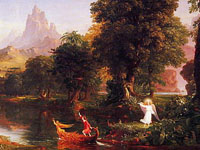Romanticism
Romanticism was an artistic, literary, and intellectual movement that originated in the second half of the 18th century in Europe. After sixty years of tremendous revolutions (French Revolutions, Revolutions of 1848) and societal upheavals where destinies were made and unmade with dramatic suddenness, a wave of revolt, known as Romanticism, rose against the claims of reason. It was a rebellion against science, authority, tradition, order, and discipline. It claimed that the intellectual works of the ‘Enlightenment’ (1715-1789), where the emphasis was on reason did not correspond with society. Defining ‘Romanticism’ can be a little tricky. It is situated neither in choice of subject nor exact truth, but in the way of feeling. Romanticism exalts individuality, intuition, feeling, imagination, inspiration, creativity and the goodness of the natural world. It looks on nature not as a world of objects to be manipulated and dissected but as something to be experienced. Romantics regarded nature, in an almost mystical way, as the opposite of the drabness of industrial life. What Romantics longed for then, and still seek
today, is an ideal society that would have peace and prosperity without violence or war. The wealth of the world
would be distributed equitably and fairly. Romantics emphasized: Machine vs.
Heart If the machine is the symbol of Rationalist thought during the Enlightenment, then the symbol for Romanticist thought is the heart or living organism. The favorite mode of the Age of Reason was analysis and simplification. In the end the love of simplicity and generality had simplified nearly everything out of existence. Any experience of life suggest that advising the soul to be lofty and the heart to keep calm while the intellect works out all the geometries needed by man and society is too simple. Jean Jacques Rousseau had been the first to point this out -- that the existence of emotion, not in order to have it substituted for reason, but in order to warn against an exclusive attachment to either. On the other side, introspection (eg, the autobiographical) became a liability for the Romanticist – egotism, error, fantasy, even silliness. His dreams or illusions needed verification, hence the Romantic passion for history. The desire to replace the abstract and machine-like by a richer experience is equivalent to replacing physics and mathematics with biology. Eventually this spirit led to the idea of evolution. One of the great contributions of the era of Romanticism is evolution as a form of thought. The reliance on particular “histories” is with us in present day society – of a medical case, of corporate profits, of an art form. The Romanticist’s fear of revolution was in part allayed by the evidence of evolution, which showed that progress was as much hindered as aided by great upheavals. The Romantics were realists in the plainest sense of the word - reality-seekers. How to organize the teeming facts of the living universe was the Romanticists' problem. Abstractions are more manageable; they are fewer and deductive logic connects them. Romanticism was seen by Isaiah Berlin as disrupting for over a century the classic Western traditions of rationality and the very idea of moral absolutes and agreed values, leading "to something like the melting away of the very notion of objective truth", and hence not only to nationalism, but also fascism and totalitarianism, with a gradual recovery coming only after the catharsis of World War II. “In the realm of ethics, politics and
aesthetics it was the authenticity and sincerity of the pursuit of inner goals that mattered; this applied equally
to individuals and groups — states, nations, movements. This is most evident in the aesthetics of romanticism,
where the notion of eternal models, a Platonic vision of ideal beauty, which the artist seeks to convey, however imperfectly, on canvas
or in sound, is replaced by a passionate belief in spiritual freedom, individual creativity…The self-expression
of the artist's own unique, inner vision, to set aside which in response to the demands of some "external" voice
— church, state, public opinion, family friends, arbiters of taste — is an act of betrayal of what alone
justifies their existence for those who are in any sense creative.”
z |

